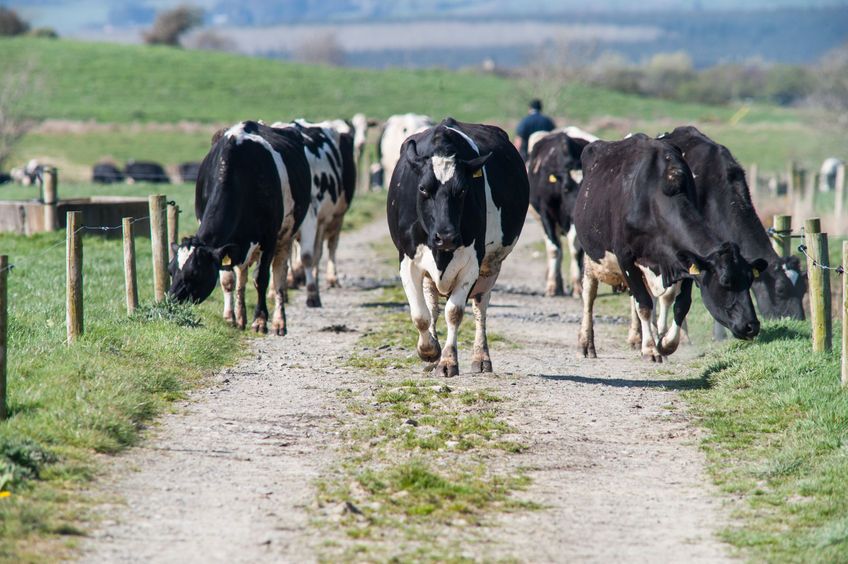
Brexit is already creating difficulties for Ireland's dairy industry, even before the UK leaves the European Union, according to the EU’s Agriculture Commissioner.
The Commissioner, Irishman Phil Hogan, said in a speech in Dublin that fluctuations in exchange rates - caused partly by the UK referendum decision to withdraw from the EU - were a concern for exporters.
The value of Sterling has fallen significantly since the referendum vote in the summer of 2016, making imports into the UK more expensive.
“Like you, I am concerned about the fluctuations in exchange rates between Sterling and the Euro,” said the Commissioner in a speech in Dublin on the outlook for the dairy industry.
“The uncertainty around Brexit has been a key factor here. The current exchange rates are creating difficult conditions for Irish companies exporting to the UK.”
Phil Hogan said that the United Kingdom was a very important market for the Irish dairy industry.
“The UK is, of course, a net importer of cheese and butter from the EU, totalling 480,000 tonnes in 2017,” he said.
Exports to the UK accounted for more than half of total Irish cheese production, he said, and for a quarter of Irish butter production.
“We must aim to diversify to new markets, taking advantage of the market access the EU has negotiated with Japan, Mexico, Vietnam and Singapore for dairy products. It is important to note that the EU will put financial support behind this effort,” he said.
China exports
Dairy was one of the sectors under focus during a trade mission to China earlier this year by the Irish Farmers Association.
Dairy exports to China amounted to €666 million in 2017, with infant formula being the major export product. Some 13 per cent of all infant formula sold in China in 2017 was Irish.
IFA president Joe Healy said that, with Brexit approaching, it "has never been more important to diversify and develop our markets and, in that context, China represents a huge opportunity."
He identified opportunities for increasing dairy, pork and beef exports to China. Like cheese, more than half of Irish beef exports currently go to the UK.
“China represents a huge opportunity. Securing a breakthrough on market access for Irish beef in April this year was a welcome development and positive news for the sector.”
He said: “China consumes one quarter of the world’s meat supply, and imported 700,000 tonnes of beef in 2017.
“There is enormous potential for further rapid growth in consumer demand for beef, with consumption expected to double by 2020, driven by increasing urbanisation and rising incomes.”
‘Premium product’
Joe Healy said the Chinese market had become an important one for Irish pigmeat products over recent years, with exports to China growing to almost €100m in 2017.
He said there was an opportunity to grow this further and to take advantage of the Chinese decision to impose tariffs on pork originating in the United States.
And he said: “The Irish agri-food industry has had considerable success in maximising the Chinese market for dairy, positioning Irish produce as a premium product.”
In his Dublin speech Phil Hogan described China as the largest world importer of dairy products.
“There are concerns regarding Chinese buying in the context of trade wars, which have had a damaging effect on the economy and business sentiment.
“Infant formula remains the most important product imported by China in terms of value, and the EU represents around three quarters of this market,” he said.
But he said that in the medium term the European Union should remain “very well-positioned on world dairy markets, despite higher production cost compared to competitors.
“Milk production growth should be sustained by increasing domestic demand, as well as an increase in global trade,” he said.
UK market
Statistics produced by Dairy Industry Ireland indicate that the industry is a key component of the Irish economy.
The industry processes about seven billion litres of milk each year, supplied by 18,000 family farms. Many of these families are owners of the primary business.
The IFA has said that securing tax-free access to the UK market should be a priority during the ongoing negotiations between Westminster and Brussels on a Brexit agreement.
Maintenance of the value of the UK market was a key priority for Irish farming and the food sector, said the IFA in a Brexit briefing.
“In addition, the potential disruption to trade flows between Ireland and Northern Ireland, with their highly integrated agri-food sector and complex supply chains, must be minimised,” said the IFA, which said that the imposition of tariffs on EU agri-food exports to the UK could make agri-food trade uneconomic.
“In addition, an increase in low cost food imports that undermines the value of the UK market would have a devastating effect on the Irish agri-food sector and on other EU agri-food exporters for whom the UK is an important trading partner.
“The value of EU agri-food exports cannot be undermined by an increase in low cost food imports into the UK market, which do not meet the high food safety, animal welfare, health and environmental standards that are required of EU producers.
“Overall, the displacement of Irish food exports from the UK market could create a serious market disturbance on the EU market, potentially destabilising the EU market balance.
“The retention of access to and maintenance of the value of the UK market is critically important, therefore, not just for the Irish farming and food sector, but for food producers and the food industry across the EU.”
The IFA said that the EU must set as a strategic objective in Brexit negotiations the maximisation of the future value of the EU farming and food sector.
